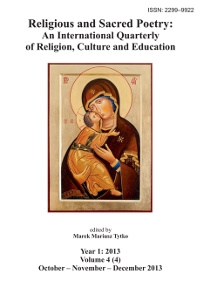The Idea of God and Religion in the Poetry of Anna Frajlich
The Idea of God and Religion in the Poetry of Anna Frajlich
Author(s): Jolanta Wrobel-BestPublished by: Fundacja Naukowa Katolików »Eschaton«
Keywords: Literary criticism; thematic critique; Polish-American poetry; Polish-Jewish diaspora in America; religious motifs in literature; Frajlich-Zając Anna (1942-); religion; philosophy; and literature; sacrum in literature; Jewish poetry of the 20th century
Summary/Abstract: The presented article is a conceptual work. It examines the poetry of Anna Frajlich-Zając (born in 1942-). The article aims at presenting Frajlich’s poetry using a very unique perspective of God and religion, which was never applied to her poetry in the past. It is also an attempt to comprehensively envision this poetry as the “palimpsest of meanings” that leads to polyphony of aesthetic values. The research method applied to the article is based on thematic critique. We also use the principles of the “hermeneutic circle” by Wilhelm Dilthey (1833-1911) to conduct the analysis. The “hermeneutic circle” stresses synergistic effects between the “whole” and “parts” of poetic writings. Finally, we underline Frajlich’s symbolic imagination as part of our methodology. The article shows an evolving structure of the idea of God and religion in the poetry of Anna Frajlich. It introduces the concept of “homo viator,” “religious syncretism,” and “closed”/“open” religion. It provides the unique interpretation of Frajlich’s poetry. The intellectual conclusions of the article are not limited to academia and journalism. They are useful to investigate popular culture and links that exist among religion, literature as well as philosophy. The results of this analysis can lead to new solutions in the humanities (literature, art, and philosophy). Also, they provide grounds for further research. The article is socially applicable in academia. It could be interesting for students as well as educators/academic instructors. The article provides a new and creative analysis of literary writings by Frajlich.
Journal: Religious and Sacred Poetry: An International Quarterly of Religion, Culture and Education
- Issue Year: 2013
- Issue No: 4
- Page Range: 187-208
- Page Count: 22

